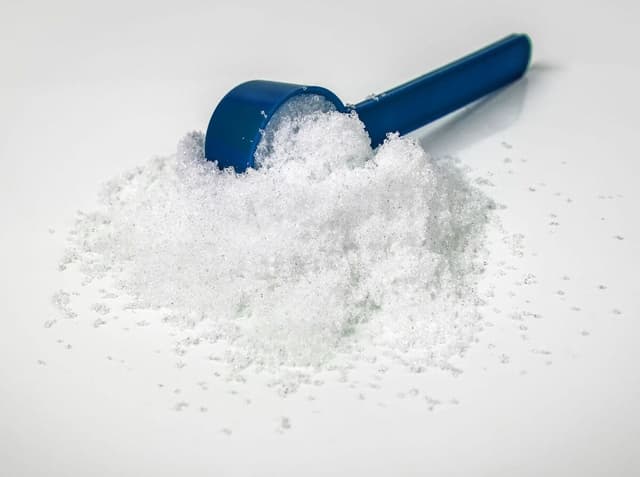Micronized Creatine vs. Regular Creatine: What’s the Difference and Why It Matters for Choosing the Best Creatine

October 17, 2024
If you're on the hunt for the best creatine supplement to boost your workout performance, you've probably stumbled upon terms like "micronized creatine" and "regular creatine." But what do these terms mean, and does it really matter which one you choose? Understanding the differences between these two forms can help you make an informed decision and maximize your gains. In this article, we'll break down the key distinctions between micronized creatine and regular creatine, so you can pick the best creatine for your fitness journey.
What is Micronized Creatine?
Creatine is a popular supplement among athletes and bodybuilders for its ability to enhance strength, increase muscle mass, and improve exercise performance. Micronized creatine is essentially creatine monohydrate that has been processed into smaller particles. This micronization process reduces the particle size by about 20 times, resulting in a powder that's finer and more easily dissolved in liquids.
But why go through the trouble of micronizing creatine? The main advantage lies in its increased solubility. Smaller particles mean that the creatine dissolves more readily in water or other beverages, making it easier to consume. This can be particularly beneficial for those who have experienced stomach discomfort or bloating from regular creatine, as better solubility can lead to improved absorption and reduced gastrointestinal issues.
Additionally, micronized creatine tends to mix more smoothly without leaving a gritty texture at the bottom of your shaker bottle. This might seem like a minor detail, but for many, the ease of mixing and consumption can make a significant difference in their supplement routine.
It's also worth noting that micronized creatine still provides the same benefits as regular creatine monohydrate. The micronization process doesn't alter the creatine molecule itself; it simply changes the particle size to enhance solubility.
Micronized vs. Regular Creatine: Key Differences
When it comes to choosing between micronized creatine and regular creatine, understanding the key differences can help you determine which is the best creatine for you.
Solubility and Absorption
The most significant difference lies in solubility. Regular creatine monohydrate has larger particles that don't dissolve as easily in liquids. This can sometimes lead to sediment at the bottom of your glass and may contribute to digestive discomfort for some users. On the other hand, micronized creatine, with its smaller particles, dissolves more completely, potentially leading to better absorption and less stomach upset.
Digestive Comfort
Some people report bloating, cramping, or diarrhea when taking regular creatine. While these side effects are generally mild, they can be inconvenient. The improved solubility of micronized creatine may reduce these gastrointestinal issues by allowing for more efficient digestion.
Mixability
If you've ever struggled with clumpy supplements, you know how frustrating it can be. Micronized creatine mixes more smoothly into liquids, reducing clumps and making it easier to consume. This can enhance the overall experience of taking creatine, especially if you're mixing it with other supplements.
Price Point
Micronized creatine is often slightly more expensive than regular creatine monohydrate due to the additional processing required. If budget is a concern, regular creatine is still an effective and economical choice. Both forms deliver the same fundamental benefits, so the extra cost of micronized creatine may or may not be justified depending on your priorities.
Purity and Quality
Some micronized creatine products may boast higher purity levels. It's essential to check for certifications like Creapure®, which indicates high-quality creatine monohydrate. Whether micronized or regular, choosing a reputable brand ensures you're getting a safe and effective product. (For more information on creatine quality, see our article on "How to Spot High-Quality Creatine Supplements.")
How to Choose the Best Creatine Supplement
Selecting the best creatine supplement depends on your individual needs and preferences. Here are some practical tips to help you make the right choice:
1. Consider Your Digestive Sensitivity
- If you experience stomach discomfort with regular creatine, try switching to micronized creatine to see if it improves your digestion.
Our Top Recommendations

Optimum Nutrition Micronized Creatine Monohydrate Powder
Micronized for easy mixing, supports muscle growth and endurance.
See on Amazon$0.35 per 5g serving

Nutricost Creatine Monohydrate Micronized Powder
Third-party tested, non-GMO, 5g of pure creatine per serving.
See on Amazon$0.2 per 5g serving

NSF Certified, supports muscle power and recovery.
See on Amazon$0.46 per 5g serving

ProMix Creatine Monohydrate Powder
Micronized, additive-free, ideal for performance and recovery.
See on Amazon$0.36 per 5g serving

NOW Foods Sports Nutrition Unflavored
100% pure creatine, GMP certified, boosts strength and endurance.
See on Amazon$0.2 per 5g serving
- Monitor your body's response when you start taking creatine, and adjust accordingly.
2. Evaluate Solubility Preferences
- If you prefer a supplement that mixes easily, micronized creatine may be more convenient.
- For those who don't mind a bit of grit, regular creatine remains an effective option.
3. Assess Your Budget
- Micronized creatine is typically more expensive due to extra processing.
- Regular creatine offers a cost-effective solution without compromising on benefits.
4. Check for Quality Certifications
- Look for products with Creapure® certification, indicating high purity and quality.
- Read reviews and do your research to find reputable brands.
5. Determine the Form You Prefer
- Creatine supplements come in powders, capsules, and even chewables.
- Choose the form that fits best into your routine, ensuring consistent usage.
6. Consider Combining with Other Supplements
- Some creatine products include additional ingredients like amino acids or electrolytes.
- Decide if you want a pure creatine supplement or a blend, depending on your fitness goals.
7. Consult with a Healthcare Professional
- Especially if you have underlying health conditions, it's wise to consult a doctor before starting any supplement regimen.
- They can provide personalized advice, helping you choose the best creatine for your needs.
Conclusion
In the debate of micronized creatine vs. regular creatine, the choice ultimately comes down to personal preference and specific needs. Both forms offer the same fundamental benefits that make creatine one of the most researched and effective supplements for improving strength and muscle mass. Micronized creatine provides enhanced solubility and may reduce digestive discomfort, making it a contender for the title of the best creatine for those with sensitive stomachs. However, regular creatine remains a highly effective and budget-friendly option for many.
Remember, the best creatine is the one that fits seamlessly into your lifestyle and supports your fitness goals. Take the time to assess your needs, consider the factors we've discussed, and choose a high-quality product from a reputable brand. If you're still unsure, don't hesitate to reach out to fitness professionals or consult with a healthcare provider.






